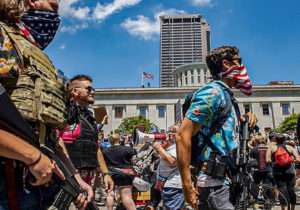 With the 2020 presidential election just over a week away, a new study from the government-funded Armed Conflict Location & Event Data Project (ACLED) named North Carolina among the states with an exceptionally high risk of increased right-wing militia activity during and immediately after the election.
With the 2020 presidential election just over a week away, a new study from the government-funded Armed Conflict Location & Event Data Project (ACLED) named North Carolina among the states with an exceptionally high risk of increased right-wing militia activity during and immediately after the election.
The ACLED partnered with research group MilitiaWatch to compile the new study, which analyzed over 80 different militia groups across the U.S. and considered both historical precedents, including violence in the past, and recent developments that have emerged over the recent lockdowns and civil unrest.
The groups specifically found that Georgia, Michigan, Pennsylvania, Wisconsin, Oregon, North Carolina, Texas, Virginia, California, and New Mexico have a significantly high risk for heightened militia activity during the upcoming election.
They note that:
“Analysis of a variety of drivers and barriers to militia activity allows for identification of high-risk locations ahead of the election. These include locations that have seen substantial engagement in anti-coronavirus lockdown protests as well as places where militias might have perceptions of ‘leftist coup’ activities. Spaces where militias have been active in setting up recruitment drives or holding training for members are also at heightened risk, as are spaces where militia members cultivate personal relationships with police or law enforcement or where there might be a friendly attitude by law enforcement towards militia presence or activity. In the context of the upcoming election, swing states are also at heightened risk, in line with scholarship around election violence and unrest
being more common in competitive spaces. And lastly, state capitals and ‘periphery’ towns also remain important potential inflection points for violence, especially in more rural and suburban areas that have been particularly conducive to the foundation and regular activities of militia groups.”
In speaking about North Carolina, the study notes that:
“North Carolina is a swing state in both the presidential election as well as the Senate race for incumbent Republican Thom Tillis’ seat. “Most paths to the White House go through North Carolina… [and this is] particularly true for President Trump” (CNBC, 20 October 2020). As such, both candidates have been spending considerable time campaigning in the state.
The state also has a history of neo-Confederate and paramilitary organization, especially around Confederate monuments — seen both this summer and last year as well. Late last month, for example, a man was arrested for having a gun at a demonstration held at a Confederate monument. Proud Boys have been active in the state since the start of the summer, engaging in protests around child sex trafficking, which have spiked in connection with the QAnon movement. In other cases, those armed at protests have not necessarily been linked to a named militia: in late June, for example, a group of white men showed up
with guns to observe a protest associated with the BLM movement in Danbury.
In addition to militia presence, there have also been a number of demonstrations in support of President Trump over the last month, including caravans and boat parades. Some of these have been linked to pro-police movements. In late August, for example, pro-police counter-demonstrators, in opposition to a march associated with the BLM movement held in Waynesville, waved US and Confederate flags alongside
Trump 2020 banners. Within this increasingly polarized context, there have also been reports of violent threats, as in mid-July in Raleigh when two men wearing “Make America Great Again” hats pulled a gun on a Black woman and her daughter after racially harassing them.
Cities with medium-sized populations, as well as suburban areas, serve as natural points of coalescence for militia activity. North Carolina is home to a number of such cities — including Greensboro and Chapel Hill — which have historically and contemporarily acted as rallying points for violence.”
What do you think about the growing militia threat in North Carolina?
Have you already voted?


